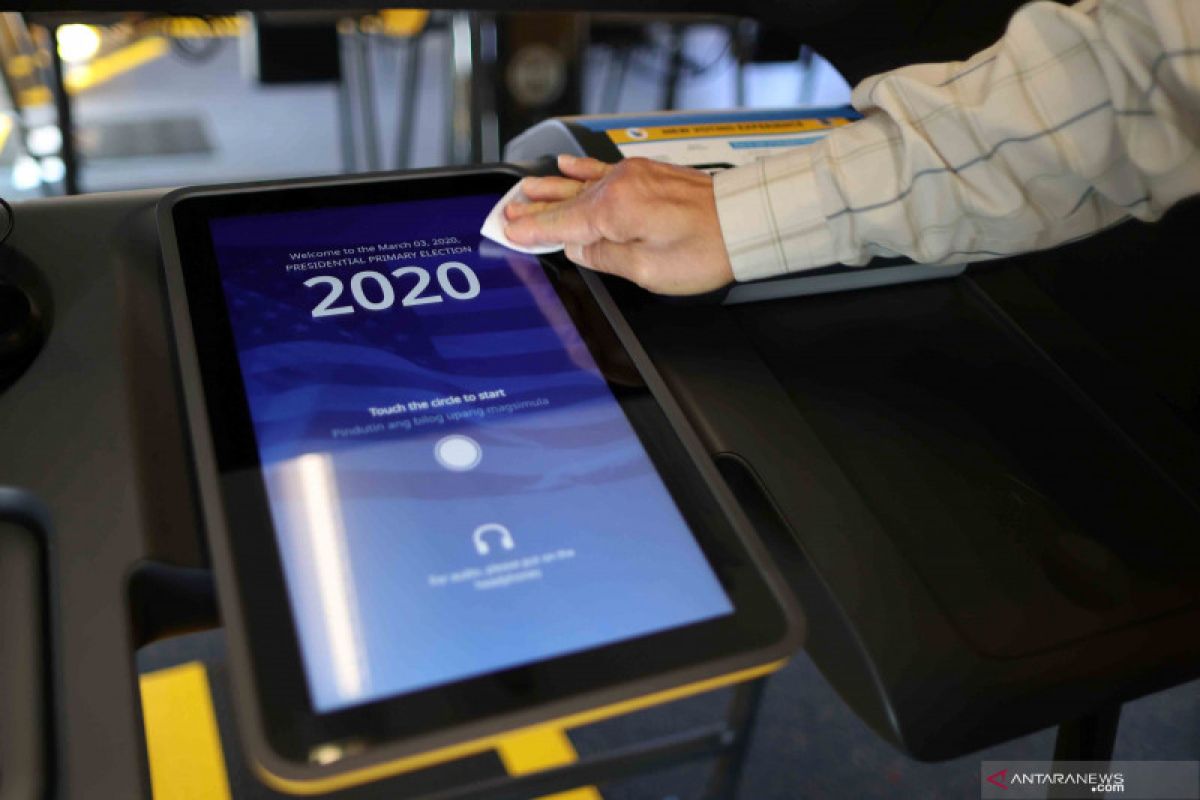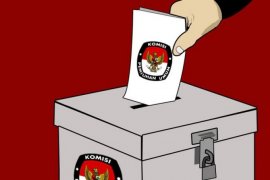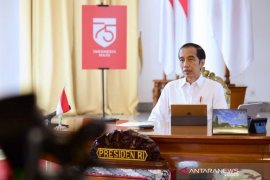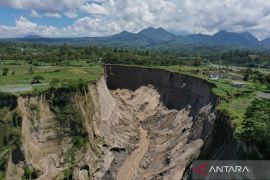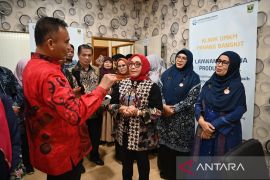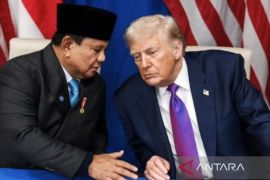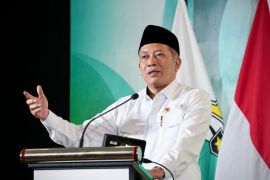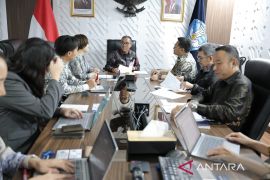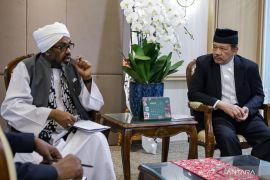The pandemic has disrupted preparations for the polls since the time they began.
In May, when the total COVID-19 cases had crossed 16 thousand, double from a month earlier, the central government had issued a regulation to postpone the concurrent regional election.
President Joko Widodo had signed Legislation Number 2 of 2020 regarding the Elections of Governor, Regent, and Mayor to regulate the postponement of the scheduled September 23 voting, with the exact alternate time to be decided later.
"The simultaneous vote on September, 2020 could not be undertaken on schedule because of (the) national disaster of COVID-19 pandemic," according to the explanation provided in Article 201A, Point (1) of the law.
"The simultaneous vote that is postponed, as written at Point (1), would be underwent (undertaken) on December, 2020," quoted from Article 201A, Point (2).
The General Election Commission (KPU) later on resumed the poll process by forming local elections committees in mid-June, regulated by the body's Legislation Number 5 of 2020, which also provides a new "amid COVID-19" electoral schedule.
People across Indonesian will cast their ballot on December 9, 2020, with as many as 270 regions, comprising nine provinces, 224 districts, and 37 cities going to polls.
Implementing strict health protocols is likely to be the only way to go through with the election.
“The KPU has issued a regulation that elaborates health protocols for each of the phases of the process," KPU head Arief Budiman had said in late August, while assuring that election staff, candidates, and voters would be asked to follow the rules.
The health protocols include rapid tests for all staff members, including those who are currently in the field updating voter information; limiting the person-in-team of the candidates when they register themselves; as well as several procedures for constituents during the on-site vote.
Several simulations of rules on washing hands, donning masks, and maintaining a safe distance were carried out by KPU in different places.
"Alhamdulillah. It is better to prevent, to anticipate. But, later perhaps (the rules) could be applied in a tighter manner, so that we (can) avoid the (coronavirus) spread," Endang, one of the voting simulation participants in Tangerang, Banten, said.
Related news: Bawaslu: KPU-Papua office advised to conduct swab testing
Related news: KPU should impose sanctions on candidates violating health protocols
Candidates infected
However, the risk of COVID-19 has cast a shadow over the polls, with several cases arising as a result of a breach of health protocols.
As of September 14, 2020, the Election Supervisory Body (Bawaslu) has recorded about 243 health protocols violations by applicants during the registration process, when candidates traditionally bring along their teams and supporters.
Head of the National Disaster Management Agency (BNPB), Doni Monardo, has stressed on the transmission risk from regional-local elections, if parties continue to flout rules.
"Health issues remain our priority. Thus, the election is important but we have to remember that there are risks lurking, if we defy (the protocols)," he noted.
Monardo added that the registration process is being monitored and, as of today, under control, “although on September 4-6, we were witnessing many crowds” turning out to support the candidates.
While KPU alone, during the same period, announced that at least 60 candidates from several provinces had been infected, based on the results of independent swab tests.
The numbers show that the likelihood of COVID-19 cases emerging from "regional elections clusters" must be taken into consideration, as promised by KPU.
Also, the situation has become more complicated as some members of the KPU have tested positive for COVID-19, with the body's chief, Arief Budiman, also announcing that he has contracted the virus.
"September 18 (2020) in the midnight, I was starting to have home quarantine since I didn't experience any symptoms (such) as cough, fever, cold, or shortness of breath. I am still doing my duties from home," he said.
Two more commissioners of KPU, Evi Novida Ginting and Pramono Ubaid, have also tested positive for the disease and both have opted for self-isolation.
Related news: Election Commission chief contracts COVID-19
Related news: Election commissioner Evi Novida Ginting infected with COVID-19
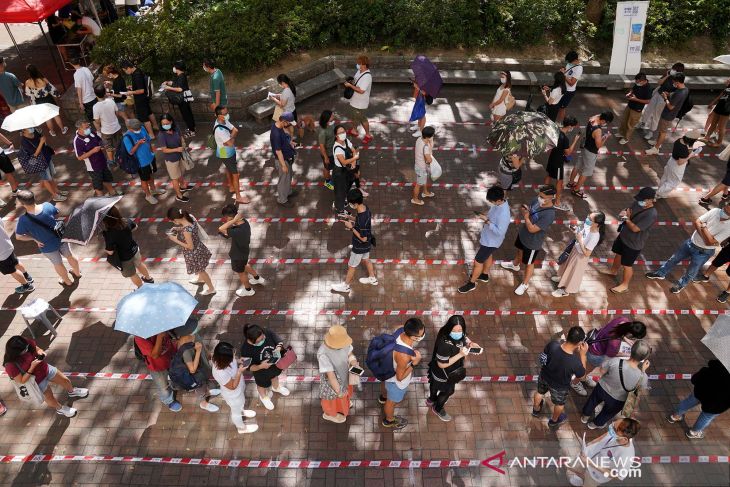
Differing opinions
Amid worries of elections giving rise to new COVID-19 transmission clusters, a recent survey conducted by Polmatrix Indonesia has shown that the public is in favor of the election being postponed again.
“The survey's findings show that 72.4 percent of participants choose the option of Pilkada Serentak 2020--the Concurrent Election of 2020--in all regions be postponed, because they are worried the mass gatherings during the election would form a new cluster," executive director of Polmatrix Indonesia, Dendik Rulianto, said in a statement released on September 16, 2020.
While 12.1 percent participants have said they would prefer delaying the election process only in high-risk areas, or red zones, 10.6 percent of the respondents have said that the election must be conducted as scheduled.
The National Commission for Human Rights has raised a similar point, stating that it would be better to postpone the election, as the institution deems the current situation is not under control.
“The KPU, the government, as well as the House of Representatives (DPR) (need) to postpone the regional electoral process until COVID-19 spread ends, or, at least is under control, according to trusted epidemiological data," chief of election monitoring at the commission, Hairansyah, said.
In terms of human rights, the real risk of COVID-19 transmissions during each stage of the election process would amount to a violation of the right to live, as well as the right to health and safety, he said.
Meanwhile, parliament member Guspardi Gaus said it would not be appropriate to halt the election, only after Arief Budiman tested positive for COVID-19.
"We couldn't just halt the election after the head of KPU contracted the virus. It is not he who defined (the election process), it is the legislation," he said.
"The fluctuating trend of COVID-19 cases has not happened because of the electoral process. It (the trend) is currently increasing, but we hope that in October-November it would go down," he added.
Despite differing opinions over the question of postponing the regional election process for a second time as well as whether it could potentially give rise to new coronavirus clusters, the President has signed a legislation providing the option of making another postponement.
"The simultaneous voting on December, 2020 could be postponed and rescheduled if it is unable to conduct the process due to the national disaster of COVID-19 has not end," cited from the explanation of Article 201A, Point (3) of the law.
Related news: COVID-19: NGO seeks postponement of local election process
Related news: Shorten local election process to reduce COVID-19 risk: academician
Editor: Yuni Arisandy Sinaga
Copyright © ANTARA 2020
